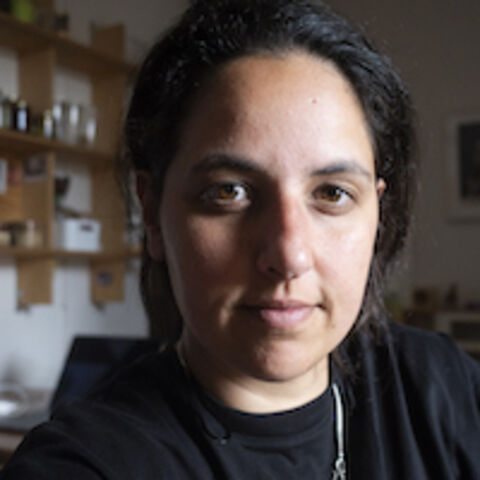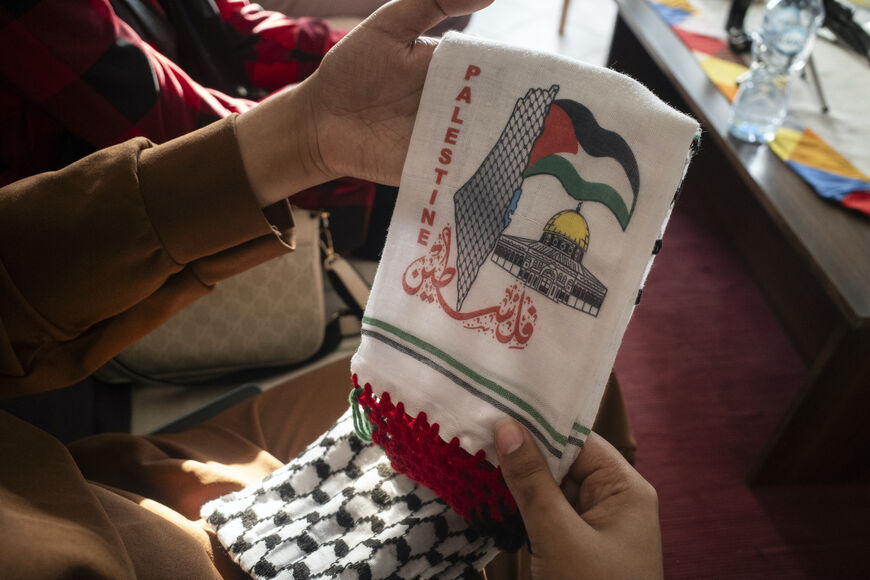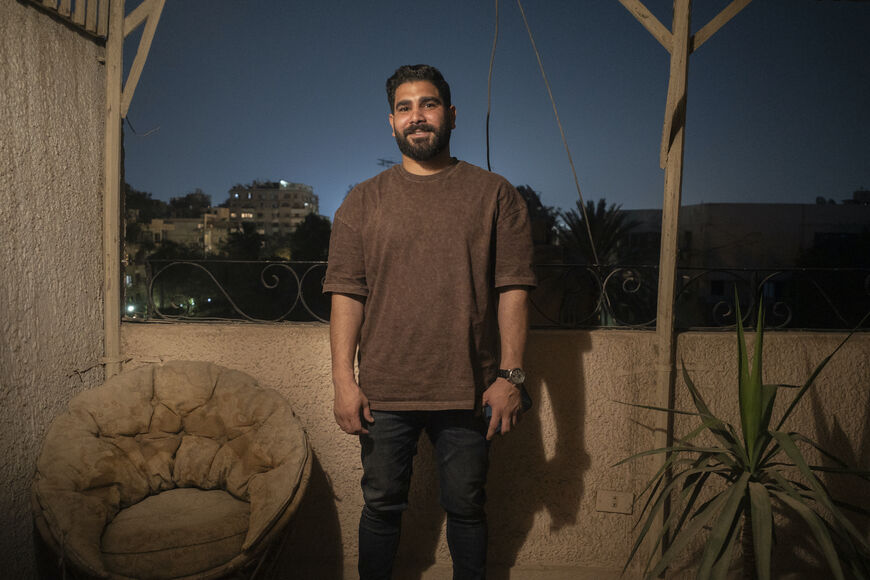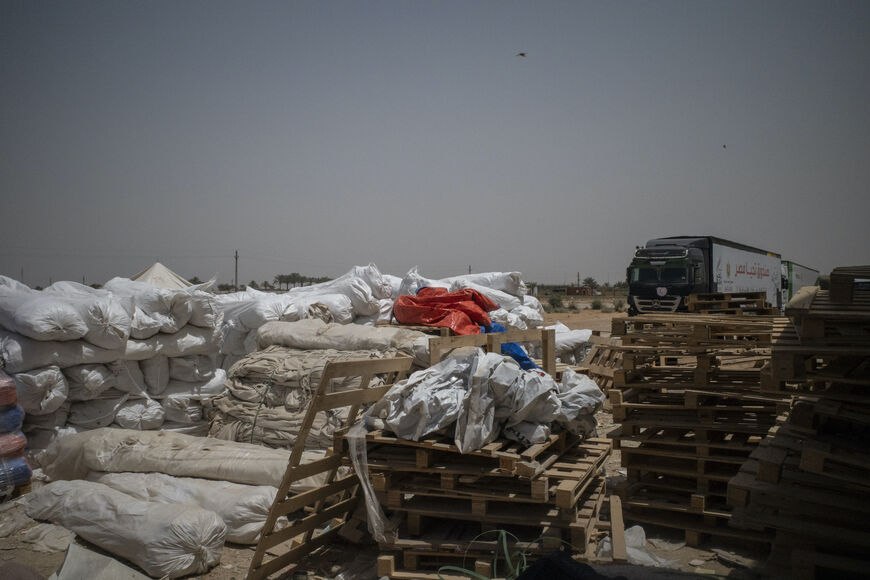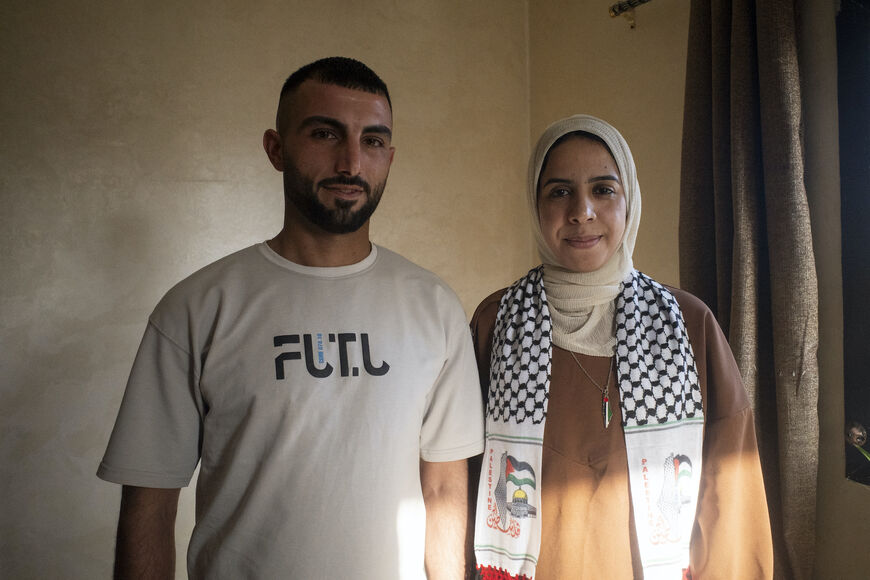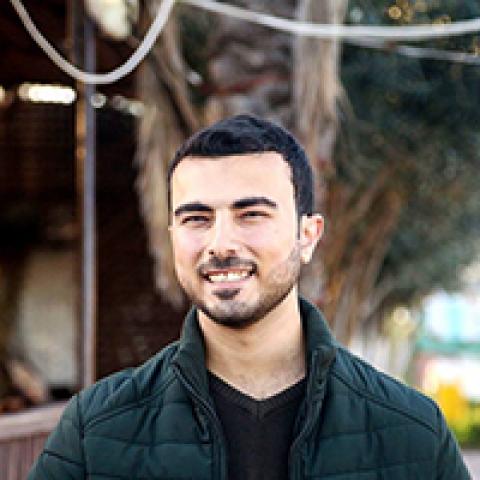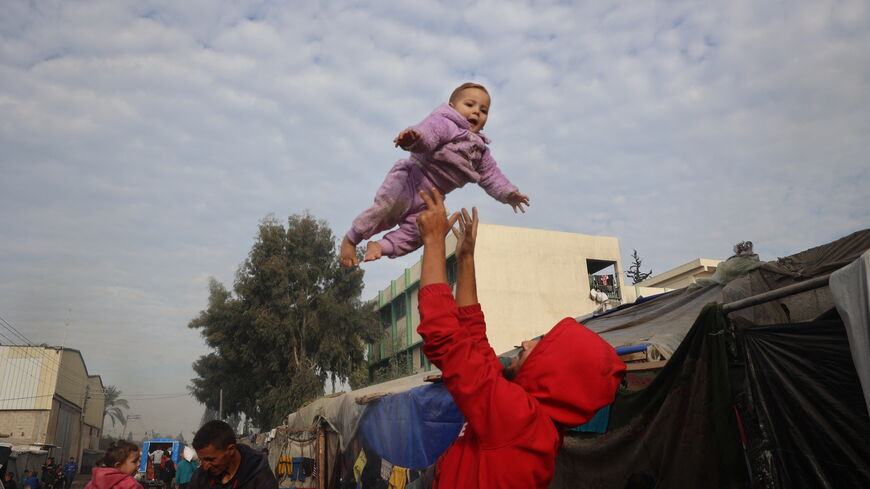In Egypt, displaced Gazans organize in grassroots movements
Despite a precarious life without rights or financial resources, displaced Gazans in Egypt are organizing themselves into grassroots movements to respond to community needs and send humanitarian aid to Gaza.
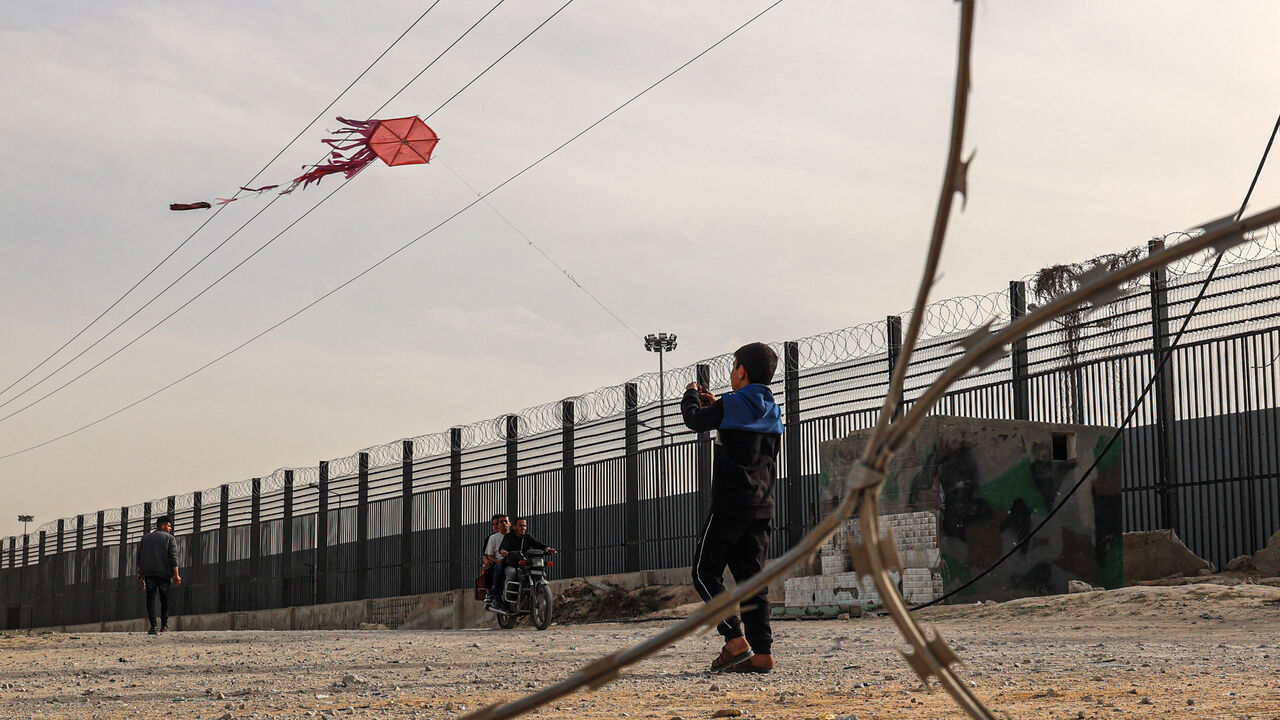
CAIRO — Since Oct. 7, 2023, the beginning of Israeli operations in the Gaza Strip, tens of thousands of Palestinians have entered Egypt through the Rafah border crossing.
Between 80,000 and 100,000 Gazans are estimated to have crossed into Egypt from Gaza since then, the Palestinian Authority’s (PA) ambassador to Cairo told Agence France-Presse (AFP) in April, without elaborating on how they entered.
Today, many of them, especially those who lack the financial means, live in the suburbs of the Egyptian capital, Cairo, in a precarious situation, with no rights and the constant fear of being expelled from the country.
“We have been facing many challenges in Cairo, such as finding a flat, paying for food and, when winter came, we had to pay for clothes as well,” says Amal Awni, a 28-year-old who hails from the Bureij camp in the central Gaza Strip. She is among those who found themselves unable to reenter Gaza after the conflict began. She left Gaza at the end of September to attend a UN event in Cairo, and since then, she has not been allowed back. “I had just gotten engaged, and we were supposed to get married, but the war changed everything,” she tells Al-Monitor.
Awni's family is still in Gaza. Only her fiancé, Ahmad Wajih, managed to join her in Cairo in April.
Practical challenges of Gazan displaced in Cairo
One of the greatest difficulties for Gazans living in Cairo is finding housing. “Although my wife has an Egyptian passport, we had difficulties finding accommodation,” Mohammed Telbani, a 30-year-old from Gaza City, explains to Al-Monitor. “We felt a certain prejudice from the Egyptians. They prefer not to rent apartments to us.”
The displaced Gazans in Cairo are spread throughout the city, although the main districts they find shelter in are Giza, Faisal, Imbaba and Ain Shams, where speculation is developing and rents for Palestinians are much higher than market prices.
In addition to the problem of housing, Gazans also face issues with accessing treatment, despite the fact that health services should be guaranteed. According to a press statement by Egypt’s minister of health and population, Khaled Abdel-Ghaffar, 44,065 injured Palestinians from Gaza received health care treatment in the country since the start of the war until Feb. 29, 2024.
Yet Palestinian sources who prefer to remain anonymous explained to Al-Monitor that access to services is often at the discretion of hospital staff.
The visa problem for Gazans
The core of the state of instability in which Gazans live in Egypt today is mainly due to the visa issue. Since the war broke out in October, and before the Israeli military takeover of the Rafah crossing, the process of getting out of Gaza was costly for Gazans.
Hala Travel, the Egyptian agency in charge of the mechanism that facilitates the entry of Gazans into Egypt — some agencies in Egypt are in charge of coordinating their exit, and Gazans have to pay a "coordination fee" — was found to be part of a speculative system that has been set up around the Gazans' need to flee the enclave, according to an investigation carried out in February by the independent Mada Masr news outlet. A visa, which used to cost around $300 before the conflict, has been granted at a cost of between $5,000 and $7,000 since Oct. 7.
But while the issue of visa fees, coupled with months of war and soaring prices inside Gaza, has had profound consequences on the economic situation of Palestinians in Cairo, its duration is another source of concern. “The visa we are issued only allows a 45-day stay, after what happens?” questions Telbani.
Before the conflict, the visa duration for Palestinians was 30 days. However, increasing the stay in Egypt to 45 days did not solve the problems. Due to the prolonged duration of the war, many Gazans have long exceeded the maximum time limit.
Because of limited visa time and unclear legislation, many Palestinians in Cairo are forced to move circumspectly, avoiding long journeys or travel within the city for fear of being checked, arrested or charged in the future with eventual extra fees in case they want to leave the country.
Between solidarity and security, the Egyptian position
However, the current uncertain condition of Gazans in Cairo cannot be understood without considering Egypt's position on the Gaza crisis. “The Egyptian acts are pushed on the one hand by a sense of solidarity with the Palestinian cause but on the other hand as a matter of security,” explains Riccardo Fabiani, project director of North Africa for the International Crisis Group. “The Egyptian authorities are terrified of facing an outflow of Palestinians onto their territory.”
But it’s not just the outflow of Palestinians that concerns Cairo’s government; it's also where it would take place. “Sinai, the region bordering the Gaza Strip, is not a territory like any other. It is an area that has been and is still going through a long phase of instability because of jihadist phenomenon,” Fabiani tells Al-Monitor, pointing to the slippery slope the Egyptian government has been on throughout this crisis.
Besides the government's position, there is also the perspective of Egyptian society that needs to be considered in the context of what is happening in Gaza, which directly impacts the displaced Palestinians. “There is a sense of exhaustion and strain in the Egyptian population,” points out Fabiani, adding, “Many Egyptians struggle to make ends meet. The refugee issue, therefore, is triggered in a potentially socially explosive context.”
According to data from UN agencies, Egypt officially hosts about half a million asylum seekers, while authorities in Cairo estimate that there are nine million foreigners residing in the country. “This population weighs enormously in a country that is even now going through an unprecedented economic crisis,” the International Crisis Group analyst explains. “Egypt has seen a series of devaluations of its own exchange rate, and in recent years inflation [hovered] around 40%,” he adds.
The activism of displaced Gazans in Cairo
But despite a precarious situation in which displaced Palestinians in Egypt face enormous social, economic and legal challenges, the feeling of solidarity with their homeland does not disappear. Formal and non-formal associations have emerged in Cairo in the past months, trying to respond to the crisis in Gaza and the needs of Gazans in Egypt.
“Palestine Charity Team, my association, was created in 2017 in Gaza,” said Alaa Asaker, a 30-year-old from Gaza City who arrived in Egypt in February.
After Oct. 7, many Palestinian associations, such as Asaker’s, had to shift their attention onto Gaza’s basic needs. “Now we are providing food baskets, clean water, medicines and haircuts to prevent the spread of diseases,” he explained.
In addition to working on the humanitarian aid supply chain to the Strip, some Palestinian associations have chosen to assist displaced Gazans. Sanad, Awni's organization, established on Oct. 20, 2023 in Cairo, is among them.
“The challenges we were facing in Cairo made us think how we could get involved,” Awni explains to Al-Monitor. “We started paying visits to the injured people who came from Gaza to get medical treatments here in Cairo.”
But in the following months, Sanad developed quickly. After a phase of assessing the basic needs of displaced Gazans, “we created mental support programs and also a system of clothes distribution for families in need,” says Awni.
Almost all Palestinian associations in Cairo rely on bottom-up donors. GoFundMe and social networks have become reliable crowdfunding systems. “At first I used Instagram a lot to try to raise money,” explained Awni, who has used this informal way to expand her network.
“Donations became bigger and bigger, and as my friends in other countries began to repost my stories and publications, the fundraising network expanded.” Today, Sanad is funded by people from all over the world, from South Africa to Canada.
A frozen future
However, the great efforts and desire to help in the Gaza crisis cannot alleviate the sense of loss and suspension of normal everyday life for the displaced Gazans in Egypt. “I don't think we will get married soon,” Awni says, talking about her future plans. “Marriage is happiness, and we don't feel that emotion now. What we want now is the end of the war and to come back [to Gaza],” she concluded.
Telbani agreed. “I had a great life: Both my wife and I had a good job, a nice flat. What's here for us?”
Asaker, on the other hand, has a different story. He had been employed about two weeks before Oct. 7 at the Arab College of Applied Sciences in Rafah, where he had studied. “It was my dream to be a professor. But I feel I must not stop. That’s how Palestinians are made.”
A month after crossing the Rafah border, Asaker was accepted into a PhD program in marketing at the Mansoura University.


